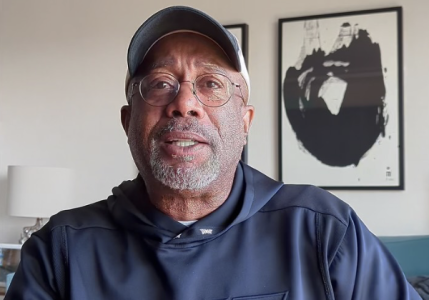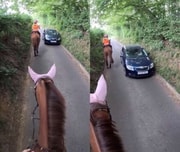Country star unleashes fury on ‘loser’ scammers in online takedown
- Replies 0
Country music fans, gather ‘round—because one of the genre’s biggest stars has just unleashed a fiery tirade against online scammers, and he’s not holding back!
If you’ve ever received a suspicious message from a 'celebrity' online (or you might one day!) you’ll want to read this.
Darius Rucker, the beloved singer-songwriter and former frontman of Hootie & the Blowfish, recently took to a social media platform to set the record straight after learning that scammers were using his name and image to trick unsuspecting fans out of their hard-earned money. And let’s just say, he didn’t mince his words.

‘Yo don’t you have anything better to do than try to scam people. U guys are the friggin worst. U are not me and have nothing to do with me. Losers man!!’
Rucker blasted in a post that quickly went viral, earning cheers from fans and fellow musicians alike.
But he didn’t stop there. When a concerned fan reached out to ask if a suspicious account was really him, Rucker replied with a resounding ‘No!’ and followed up with a clear warning: ‘Everyone, this is my only account. Don’t have a personal account or anybody who works for me, including my kids, will not have an account that will ask u for money. They are scammers.’
It’s a message that can’t be repeated enough, especially as online scams become more sophisticated and widespread.
The Australian Competition and Consumer Commission (ACCC) has reported a sharp rise in social media scams in recent years, with many fraudsters posing as celebrities or public figures to gain trust and exploit fans’ goodwill.
Typically, scammers create fake social media profiles using a celebrity’s name and photos.
They’ll reach out to fans, often with flattery or promises of exclusive content, and then ask for money—sometimes for a fake charity, a bogus competition, or even a supposed 'meet and greet.' The goal? To trick you into handing over your cash or personal information.
The US Federal Trade Commission (FTC) has also weighed in, advising fans to be vigilant: ‘If a celebrity contacts you out of the blue and asks for money, it’s almost certainly a scam. Do some research: search online for the celebrity’s name plus 'scam.' Never send money or personal details to someone you haven’t met in person.’
Sadly, Darius isn’t the first—and won’t be the last—celebrity to have his identity hijacked by scammers.
From Dolly Parton to Keith Urban, many stars have spoken out about fake accounts targeting their fans.
Rucker’s recent outburst comes at a busy time for the star. Just days earlier, he made headlines for having to cut a concert short due to vocal issues, promising fans he’d make it up to them.
‘We looked at every option to reschedule, but unfortunately, it’s just not possible this year, so we’re issuing full refunds,’ he shared on Instagram, showing his genuine care for his supporters.
Unfortunately, scammers often target older Australians, knowing that many of us are generous, trusting, and active online.
According to Scamwatch, Australians over 60 lost more than $56 million to scams in 2023 alone, with social media and email being the most common methods of contact.
Remember, no genuine celebrity will ever ask you for money or personal details online. If in doubt, check their official website or contact their management team.
Related story: 'There needs to be some accountability': Man's 'horrible' mistake costs him $20,000

Have you or someone you know ever been targeted by a scammer pretending to be a celebrity? How did you handle it? Share your stories and tips in the comments below! And if you spot a suspicious account, don’t be afraid to call it out, just like Darius did.
If you’ve ever received a suspicious message from a 'celebrity' online (or you might one day!) you’ll want to read this.
Darius Rucker, the beloved singer-songwriter and former frontman of Hootie & the Blowfish, recently took to a social media platform to set the record straight after learning that scammers were using his name and image to trick unsuspecting fans out of their hard-earned money. And let’s just say, he didn’t mince his words.

Country music star Darius Rucker slammed scammers pretending to be him online, calling them 'losers' and warning fans not to fall for fake accounts. Image source: @dariusrucker / Instagram.
‘Yo don’t you have anything better to do than try to scam people. U guys are the friggin worst. U are not me and have nothing to do with me. Losers man!!’
Rucker blasted in a post that quickly went viral, earning cheers from fans and fellow musicians alike.
But he didn’t stop there. When a concerned fan reached out to ask if a suspicious account was really him, Rucker replied with a resounding ‘No!’ and followed up with a clear warning: ‘Everyone, this is my only account. Don’t have a personal account or anybody who works for me, including my kids, will not have an account that will ask u for money. They are scammers.’
It’s a message that can’t be repeated enough, especially as online scams become more sophisticated and widespread.
The Australian Competition and Consumer Commission (ACCC) has reported a sharp rise in social media scams in recent years, with many fraudsters posing as celebrities or public figures to gain trust and exploit fans’ goodwill.
Typically, scammers create fake social media profiles using a celebrity’s name and photos.
They’ll reach out to fans, often with flattery or promises of exclusive content, and then ask for money—sometimes for a fake charity, a bogus competition, or even a supposed 'meet and greet.' The goal? To trick you into handing over your cash or personal information.
The US Federal Trade Commission (FTC) has also weighed in, advising fans to be vigilant: ‘If a celebrity contacts you out of the blue and asks for money, it’s almost certainly a scam. Do some research: search online for the celebrity’s name plus 'scam.' Never send money or personal details to someone you haven’t met in person.’
Sadly, Darius isn’t the first—and won’t be the last—celebrity to have his identity hijacked by scammers.
https://x.com/dariusrucker/status/1946624753818624361
Source: @dariusrucker / X.
Source: @dariusrucker / X.
From Dolly Parton to Keith Urban, many stars have spoken out about fake accounts targeting their fans.
Rucker’s recent outburst comes at a busy time for the star. Just days earlier, he made headlines for having to cut a concert short due to vocal issues, promising fans he’d make it up to them.
‘We looked at every option to reschedule, but unfortunately, it’s just not possible this year, so we’re issuing full refunds,’ he shared on Instagram, showing his genuine care for his supporters.
Unfortunately, scammers often target older Australians, knowing that many of us are generous, trusting, and active online.
According to Scamwatch, Australians over 60 lost more than $56 million to scams in 2023 alone, with social media and email being the most common methods of contact.
Remember, no genuine celebrity will ever ask you for money or personal details online. If in doubt, check their official website or contact their management team.
Related story: 'There needs to be some accountability': Man's 'horrible' mistake costs him $20,000
Key Takeaways
- Country music star Darius Rucker slammed scammers pretending to be him online, calling them 'losers' and warning fans not to fall for fake accounts.
- Rucker made it clear via social media that he only has one official account and neither he nor anyone connected to him would ever ask fans for money online.
- The scam issue is widespread, with authorities like the FTC reminding people to research before sending money online and to watch out for celebrity impersonators.
- Despite recent concert troubles due to vocal issues, Rucker’s tour is back on schedule after doctor-ordered rest, with dates lined up through to December 2025.
Have you or someone you know ever been targeted by a scammer pretending to be a celebrity? How did you handle it? Share your stories and tips in the comments below! And if you spot a suspicious account, don’t be afraid to call it out, just like Darius did.







